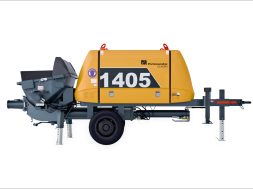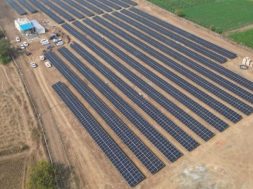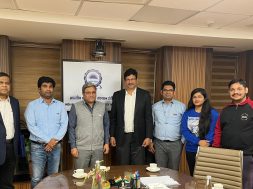Right equipment aids smarter road construction

Technical efficiency, higher uptime, lower cost of operation, among others crucial in equipment for faster delivery of projects.
Road construction is a fast-paced sector today. Hence, selection of the appropriate equipment that saves energy and fuel while maintaining uptime, is crucial.Fuel efficiency should be the prime consideration as it consists up to 60 per cent of the costs involved.
Selecting the right equipment
While selecting road construction equipment (CE),one should consider factors such as machine uptime, technical efficiency, long working hours, unit cost of production, spare parts availability, reliability and productivity.
“An equipment with these features not only ensures timely completion of the project, but also helps complete project within the stipulated timeline and optimum safety parameters. Understanding these factors would help the customer make an informed decision and invest wisely,” says Ajay Aneja, Brand Leader, CASE India.
“Volvo CE is proud to be driving advances in the technology of existing road construction machines, like pavers with sensors; P4370B ABG and P5320ABG,” says Dimitrov Krishnan, Vice President and Head of Volvo CE India.
Paving quality of a road is defined by the paver’s ability to satisfy three requirements in line with the highway design; mat thickness, level of the mat and the grade required. Regular pavers without sensors simply follow the undulations of the road base and are therefore unable to give a smooth finish to a paved surface. But sensor pavers have intelligent operating technology that helps the machine deliver on these three requirements.
According to Krishnan, Volvo SD110BA is designed to achieve high quality compaction and a flawless mat finish. Utilising infinite frequency choices and dual amplitudes, the versatile machine gives operators the flexibility to modify the drum’s dynamic force according to material depth and type. With a flip of a switch, the operator can easily adjust the amplitude from the operator console to adapt to varying layer thickness, ensuring precise compaction. Similarly, the DD90B double drum asphalt compactor can handle varying conditions and widths to offer flexible pavement compaction in a variety of applications, including parking lots and airport runways.
Ratan Lal Kashyap, Sr. Vice President – Procurement, G R Infraprojects Ltd states the essential factors for selecting appropriate equipment for road construction:
• Technology: Equipment need to be technologically advanced so that higher yields and lowest cost can be achieved, thereby increasing overall project profitability.
• Reliability and ruggedness: The equipment should be able to withstand the extreme climatic variations and also be reliable.
• Price factor: The cost of equipment should be appropriate of what the equipment has to offer.
• After-sales support: While choosing a machine ensure, replacement parts are easily available and appropriately priced. Additionally, ensure that adequate after-sales support is available at short notices since machine down time leads to additional project cost.
Increasing fuel-efficiency
“Fuel consumption should be measured and considered based on cost per unit of output instead of measuring it by the hour. Efficient fuel consumption enhances the profit margin and also helps in reducing the environmental pollutions,” says Kashyap. Adequate training is provided to the operators which enables them to maximise their optimisation level of the equipment and thereby increase the fuel efficiency with greater uptime.
“Volvo CE is focused on productivity and lowering the cost of operations, or cost per tonne, for customers. A big contributor to this is fuel efficiency. It’s not unusual for a Volvo CE customer to report fuel savings of 10 per cent or more for one of our machines versus a competitor model. Volvo CE has a long-standing reputation for fuel-efficient, high-performance equipment that delivers unbeatable uptime,” says Krishnan.
The company’s soil compactors are equipped with smooth drum and responsive controls which deliver exacting finishing work which means the machines need to make fewer passes. These factors contribute to a faster construction timeline. Volvo machines are some of the most fuel-efficient on the market.
Volvo’s versatile and intelligent machines help the operator to achieve as high a level of performance and efficiency as possible, whatever the demands of the job. Volvo’s advanced drum control system allows the operator – via an easy-to-use console – to adjust the frequency and amplitude, compensating for changing soil types and conditions. Two frequency settings come as standard but five can be included as an option. High or low amplitude can be selected to adjust the drum’s dynamic force based on the job and material depth. Meanwhile, the optimised centrifugal force and auto-vibration feature also improve performance, ease of operation and productivity. The traction system provides excellent climbing and traction capabilities in difficult applications, such as steep inclines or slippery surfaces, preventing wheel or drum spin for excellent gradeability, performance and productivity, says Krishnan.
Uptime optimisation benefits a machine in every possible way. It helps in maintaining optimum working hours, higher productivity, minimum asset breakdown, longer life, and finally better revenue and profits for the vendor. “In terms of fuel efficiency, with greater uptime there will be less requirement of the machine to reuse fuel, which will automatically improve the fuel efficiency of the equipment,” says Aneja.
In terms of fuel efficiency, with greater uptime there will be less requirement of the machine to reuse fuel, which will automatically improve the fuel efficiency of the equipment.
Ajay Aneja, Brand Leader, CASE India
Volvo CE has a long-standing reputation for fuel-efficient, high-performance equipment that delivers unbeatable uptime.
Dimitrov Krishnan, Vice-president and Head of Volvo CE India
Fuel consumption should be measured and considered based on cost per unit of output instead of measuring it by the hour.
Ratan Lal Kashyap, Sr. Vice President – Procurement, G R Infraprojects Ltd
Cookie Consent
We use cookies to personalize your experience. By continuing to visit this website you agree to our Terms & Conditions, Privacy Policy and Cookie Policy.









